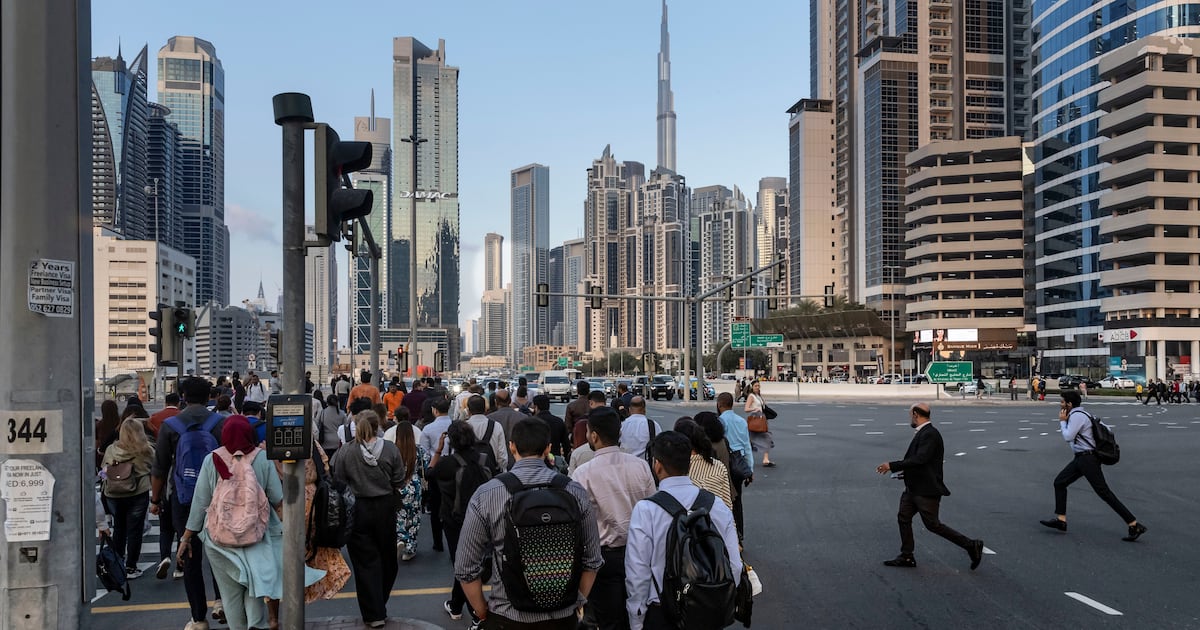The UAE Central Bank has increased its 2025 growth forecast for the country’s economy from 4.4 per cent to 4.9 per cent, as a surge in non-oil activity drives momentum.
The economy is projected to further expand by 5.3 per cent in 2026, the banking regulator said in its Quarterly Economic Review report on Thursday.
Overall, in the first quarter of the year, the UAE’s economy grew by 3.9 per cent year-on-year. Non-oil gross domestic product expanded by 5.3 per cent over the same quarter, on the back of strong performance by sectors including manufacturing, financial services, construction and real estate.
The revised projection for this year is supported by the “anticipated strong momentum in the non-hydrocarbon activities and a robust increase in the hydrocarbon sector following updated Opec+ production plans”, the Central Bank said.
The forecasts are largely in line with Emirates NBD’s expectations this year of “about 5 per cent headline GDP growth” thanks to expansion in the oil and non-oil sectors, Edward Bell, acting group head of research and chief economist at Emirates NBD, said in a research note on Friday.
The UAE Cabinet on Wednesday announced the launch of the National Policy for Economic Clusters, with the goal of boosting the country’s gross domestic product by more than Dh30 billion ($8 billion) a year.
“The focus will be on enhancing the UAE’s knowledge economy with specific clusters dedicated to financial services, tourism, space, communications and data as well as food,” Mr Bell said.
The UAE has been boosting efforts to diversify its economy away from oil. Non-oil GDP rose 5.3 per cent rise on a yearly basis in the first quarter, rising to Dh352 billion, contributing more than 77 per cent of total real GDP, preliminary estimates released this month by the Federal Competitiveness and Statistics Centre have shown. The country’s overall GDP from January to March rose to Dh455 billion.
Oil-related activities accounted for 22.7 per cent of GDP in the first three months of 2025, official data showed. Non-oil private sector activity in the UAE also rose in August, with the seasonally adjusted S&P Global UAE Purchasing Managers’ Index climbing to 53.3, from 52.9 in July.
The Central Bank on Wednesday lowered its benchmark interest rate, mimicking the US Federal Reserve’s move to lower its benchmark rate by a quarter of a percentage point, from 4 per cent to 4.25 per cent.
The UAE regulator said it would cut the base rate applied to its overnight deposit facility by 25 basis points to 4.15 per cent, from 4.40 per cent previously.
Inflation in the UAE has also eased, thanks to lower energy and food costs, the Central Bank said in its quarterly report. Prices increased 0.6 per cent in the second quarter, with the regulator lowering its 2025 inflation forecast to 1.5 per cent on moderating transport costs, as well as food and non-energy commodity prices. Inflation is expected to edge up slightly to 1.8 per cent in 2026.
Growth in the UAE has been supported by manufacturing, real estate, financial services and construction sectors, Mr Bell added.
The real estate sector remained buoyant in the first five months of the year, with residential sales rising 13.7 per cent annually during the period, the Central Bank said. Off-plan sales climbed 14.3 per cent, while ready home transactions also saw double-digit growth.
Tourism also expanded, with Dubai welcoming nearly 10 million international visitors in the first half of the year, up 6.1 per cent annually. Passenger traffic through the Abu Dhabi and Dubai airports topped about 62 million combined.
The UAE banking sector also performed strongly, with bank deposits up more than 13 per cent year-on-year in the second quarter, while lending was up 11 per cent, the Central Bank data showed. Asset quality improved, too, with capital buffers staying well above regulatory requirements.
COMPANY%20PROFILE
%3Cp%3E%3Cstrong%3ECompany%3A%20%3C%2Fstrong%3EGrowdash%0D%3Cbr%3E%3Cstrong%3EStarted%3A%20%3C%2Fstrong%3EJuly%202022%0D%3Cbr%3E%3Cstrong%3EFounders%3A%20%3C%2Fstrong%3ESean%20Trevaskis%20and%20Enver%20Sorkun%0D%3Cbr%3E%3Cstrong%3EBased%3A%20%3C%2Fstrong%3EDubai%2C%20UAE%0D%3Cbr%3E%3Cstrong%3EIndustry%3A%20%3C%2Fstrong%3ERestaurant%20technology%0D%3Cbr%3E%3Cstrong%3EFunding%20so%20far%3A%3C%2Fstrong%3E%20%24750%2C000%0D%3Cbr%3E%3Cstrong%3EInvestors%3A%20%3C%2Fstrong%3EFlat6Labs%2C%20Plus%20VC%2C%20Judah%20VC%2C%20TPN%20Investments%20and%20angel%20investors%2C%20including%20former%20Talabat%20chief%20executive%20Abdulhamid%20Alomar%2C%20and%20entrepreneur%20Zeid%20Husban%3C%2Fp%3E%0A
The burning issue
The internal combustion engine is facing a watershed moment – major manufacturer Volvo is to stop producing petroleum-powered vehicles by 2021 and countries in Europe, including the UK, have vowed to ban their sale before 2040. The National takes a look at the story of one of the most successful technologies of the last 100 years and how it has impacted life in the UAE.
Read part four: an affection for classic cars lives on
Read part three: the age of the electric vehicle begins
Read part one: how cars came to the UAE
Mohammed bin Zayed MajlisRead more about the coronavirusKILLING OF QASSEM SULEIMANIZayed Sustainability Prize

